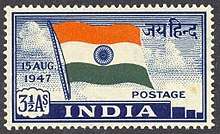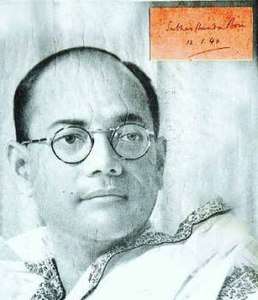Jai Hind

Jai Hind (Hindi: जय हिन्द) (Bengali: জয় হিন্দ) is a salutation, slogan, and battle cry most commonly used in India to indicate patriotism towards India (also known as Hind). It translates roughly to "Victory to India"[1] or "Long live India".[2] The term was coined by Abid Hasan[3], and was used by Netaji Subhas Chandra Bose[4][5] of the Indian National Army as a shortened version of Jai Hindustan Ki.
In popular culture

A follower of Indian nationalist Subhas Chandra Bose, Ramchandra Moreshwar Karkare, of Gwalher (Gwalior) Madhya Bharat, wrote a patriotic drama Jai Hind in March 1947 and published a book in Hindi, with the same title. Later, Karkare became Congress president of Central India Province.


The Jai Hind postmark was the first commemorative postmark of Independent India, and was issued on the day of independence, 15 August 1947. "जय हिन्द" is also stated on the first, Independence series of Indian stamps.
The phrase is used on All India Radio at the end of a broadcast. It occurs in the patriotic song "Aye Mere Watan Ke Logo" sung by Lata Mangeshkar in 1963.[6]
Mahatma Gandhi sent a piece of crocheted, cotton lace made from yarn personally spun by himself, with the central motif Jai Hind, to British Royal couple Queen Elizabeth II and Prince Philip as a wedding gift in 1947.[7]
The phrase has also given its name to
- Jai Hind (1999), a Hindi film, made by actor-director Manoj Kumar[8]
- The comedy show Jay Hind! (2009)
- Jai Hind College, Mumbai
- Jai Hind, a Gujarati newspaper
- JaiHind TV.
See also
References
- ↑ Chopra, Pram Nath (2003). A comprehensive history of modern India. Sterling Publishing. p. 283. ISBN 81-207-2506-9. Retrieved 17 February 2010.
- ↑ James, Lawrence (1997). The Rise and Fall of the British Empire. Macmillan. p. 548. ISBN 978-0-312-16985-5. Retrieved 17 February 2010.
- ↑ https://en.m.wikipedia.org/wiki/Abid_Hasan
- ↑ Leonard A. Gordon (1990). Brothers Against the Raj. Columbia University Press.
- ↑ "A tale of two cities". The Hindu. 30 January 2014. Retrieved 31 January 2014.
- ↑ Chaturvedi, Mamta (2004). Filmi & non-filmi songs. Diamond Pocket Books. p. 38. ISBN 81-288-0299-2.
- ↑ "Archived copy". Archived from the original on October 8, 2015. Retrieved November 10, 2015.
- ↑ Jai Hind on IMDb
